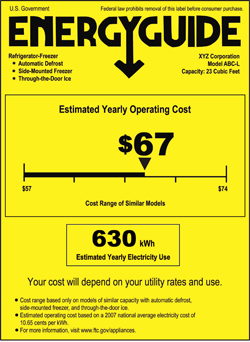Three online retailers have agreed to pay more than $400,000 in total penalties to settle Federal Trade Commission charges that they failed to post EnergyGuide information on their websites to inform consumers about the energy use of major home appliances they sell. The agency also notified two other online sellers that it will seek a total of $640,000 in fines from them.
According to the FTC, the online appliance retailers knowingly violated the FTC’s Appliance Labeling Rule, which requires them to provide EnergyGuide information for certain products such as refrigerators, freezers, dishwashers, air conditioners, water heaters, and washing machines. The information estimates the annual cost to operate the appliance.
“Companies selling appliances covered by the FTC’s rules, either online or in stores, have an obligation to provide EnergyGuide labels,” said David Vladeck, Director of the Bureau of Consumer Protection. “The information on the labels helps shoppers make smart buying decisions that take into account energy use.” 
The civil penalty cases are the first the agency has brought against online retailers for Appliance Labeling Rule violations.
The FTC used its authority under the Energy Policy and Conservation Act (EPCA) to assess civil penalties for knowing violations of the Appliance Labeling Rule against five online retailers, which also operate brick-and-mortar stores in New York, New Jersey, Connecticut, Illinois, and California. Three of those companies have settled with the agency and agreed to pay the following amounts: P.C. Richard & Son, Inc., $180,000; Abt Electronics, Inc., $137,500; and Pinnacle Marketing Group, Corp., $100,000. Two other companies, Universal Computers and Electronics, Inc. and Universal Appliances, Kitchens, and Baths, Inc., have not agreed to settle the FTC charges.
Before the FTC may assess civil penalties under the EPCA, it must notify the non-settling companies of the proposed penalty amounts. The companies can then choose to pay the proposed penalty or be sued by the FTC in an administrative proceeding. The FTC has proposed penalties of $540,000 against Universal Computers and Electronics, Inc. and $100,000 against Universal Appliances, Kitchens, and Baths, Inc.
The administrative complaints and consent orders announced today were issued against: 1) P.C. Richard & Son, Inc and P.C. Richard & Son, LLC, doing businesses as (d/b/a) Pcrichard.com, based in Farmingdale, New York; and 2) Abt Electronics, Inc., d/b/a abt.com, based in Glenview, Illinois; and 3) Pinnacle Marketing Group, Corp., d/b/a homeeverything.com, based in Brooklyn, New York.
The notices of proposed civil penalties announced today were issued against: 1) Universal Computers and Electronics, Inc., d/b/a appliancebestbuys.com, based in Jamaica, New York; and 2) Universal Appliances, Kitchens, and Baths, Inc., d/b/a universal-akb.com, based in Studio City, California.
The Commission vote approving the three complaints and consent orders and two notices of proposed civil penalties was 5-0 in each case.
NOTE: The Commission authorizes the filing of a complaint when it has “reason to believe” that the law has or is being violated, and it appears to the Commission that a proceeding is in the public interest. A complaint is not a finding or ruling that the defendants have actually violated the law. A consent agreement is for settlement purposes only and does not constitute an admission of a law violation. When the Commission issues a consent order on a final basis, it carries the force of law.
NOTE: Before the Commission may issue an order assessing a civil penalty under the Energy Policy and Conservation Act or its Appliance Labeling Rule against any person, the Commission is required to provide such person with notice of the proposed penalty and the alleged violation. Such a notice is not a finding or ruling that the person has actually violated the law.
Copies of the documents mentioned in this release are available on the FTC’s website at www.ftc.gov. The Federal Trade Commission works for consumers to prevent fraudulent, deceptive, and unfair business practices and to provide information to help spot, stop, and avoid them. To file a complaint in English or Spanish, visit the FTC’s online Complaint Assistant or call 1-877-FTC-HELP (1-877-382-4357). The FTC enters complaints into Consumer Sentinel, a secure, online database available to more than 1,800 civil and criminal law enforcement agencies in the U.S. and abroad. The FTC’s website provides free information on a variety of consumer topics.
(FTC File Nos. 102-3041, Home Everything; 102-3040, Appliance Best Buys; 102-3038, ABT Electronics; 102-3039, PC Richard; and 102-3042, Universal Appliances, Kitchens, and Baths)

